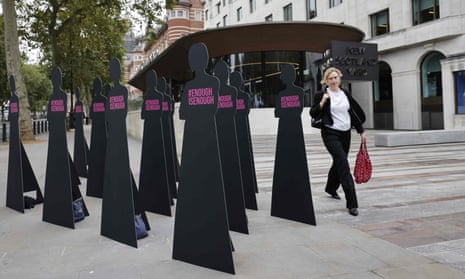The murders of Sarah Everard and Sabina Nessa could mark a turning point in men taking responsibility for male violence against women and girls, experts have said.
Groups led by men that work to end violence against females have experienced a surge in interest from other men, but organisers say if the momentum is not harnessed the opportunity will be lost.
Beyond Equality had 150 men come forward in the two weeks after Everard’s death, asking to volunteer at the charity. Previously the average was two men a week. The surge in interest has been sustained: more than 80 schools booked workshops with the group in the past week, compared with an average of three inquiries a week previously.
“It’s a sign of how badly our work is needed that it takes not just the death of two women at the hands of men – because women are killed by men all the time – but the wall-to-wall coverage that these two murders received, for men to contact us in these numbers,” said Dr Daniel Guinness, the managing director of Beyond Equality.
But whatever the motivation, Guinness said increasing numbers of men were realising that protecting women is not just about being a good person themselves. “All men are responsible for the violence,” said Guinness.
“I have never met a man who hasn’t condoned a dialogue by joking along or staying silent where misogynistic or sexist comments were made. But by not challenging those attitudes, you’re giving your tacit approval to the misogynist making the comments, which leads to the normalisation of those attitudes, which ultimately leads to the abuse of women,” he said. “It’s a continuum.”
Michael Conroy, the founder of the community group Men at Work, agreed. “I might be a good guy who would never hurt a woman but this isn’t about me: this is about men, plural,” he said.
Conroy, who also said his company had received much more work since the murders of Everard and Nessa, pointed to Philip Allott, North Yorkshire’s police commissioner, who said Everard “never should have submitted” to arrest by her killer. “All men are in this up to their necks in one way or other, so it’s up to all men to work actively to dismantle it,” he said.
Davy Thompson, the campaign manager for the charity White Ribbon Scotland, said. “Many men realise they shouldn’t walk behind a woman late at night because it scares her,” he said. “But it’s not enough to just change your route: men need to change the atmosphere where simply being a man in a woman’s vicinity at night is a source of fear for her.
“That starts with men squeezing the social spaces in which sexist men feel their misogyny is condoned until those men are left with no spaces in which they feel their attitudes are normal,” he said.
The organisation What Can I Do? was set up by the musician Mark Hegarty in the wake of the murders. “I’m just a normal bloke who had thought this issue didn’t affect me. But then I started talking to the women around me and I realised that male violence affected every single one of them,” said Hegarty, who co-founded the group with Gauri Taylor-Nayar, a campaigner against of domestic violence.
“This is a really pivotal moment,” said Dr Stephen Burrell, a trustee for White Ribbon UK, which was contacted by the Wunderman Thompson consultancy after Everard’s murder to advise on a nationwide advertising campaign to encourage all men to take responsibility for male violence towards women.
But this “sea change” could ebb away if not harnessed, he warned. “For real, meaningful change, we need to see much more action from governments and other organisations as well, including the police, schools, universities and workplaces.”
The group Engage will hold what it says is the first male-led, international pro-feminist online conference in November. While the event was arranged before the murders, organisers have said male interest in it has increased dramatically since.
But Chris Green, the founder of Engage, said that while the increased interest was good, it was not enough. “We’re still a long, long way from engaging men in a mass way,” he said.
Green is worried by what he said were powerful forces working to reverse any progress made by anti-violence groups, including the “massive juggernaut” of online pornography and the ongoing failure of four UK parliaments and three UK prime Ministers to ratify the Istanbul convention, an international treaty protecting women’s rights that is already law in 21 European countries.
Darshan Sanghrajka, the co-founder of the Being ManKind project, said he feared the increase in online misogyny would undo any advances made. “Over the last couple of years, the internet has become increasingly toxic,” he said, pointing to Facebook’s own researchers who found that 64% of all extremist “group joins” were due to its recommendation tools.
“Algorithms quickly suck you into an echo chamber where groups are increasingly extreme,” he said. “You end up in an alternate reality where your feelings of being slighted by women can easily get manipulated into a determination to revenge yourself against them.”
However, James McCann, a co-founder of the Feminist Men Project, said men had no choice but to plough on. “It can be easy to feel overwhelmed but we fight for change because we must. We have to aspire to a better quality of life for everybody, always.”
